The 50 amp chargers deliver 12 kilowatts of power. Batteries can be recharged in four hours if a 20% discharged, medium-capacity electric vehicle battery is used as a charger. In one hour, a 50-amp charger will add 50 miles of range to an electric automobile. The rapid speed of these chargers is one of the reasons for their popularity.
Because most electric vehicles are restricted to 48 amps, they cannot accept more current. As a result, 50 amp versions are the optimal option for popular automobiles because they provide the quickest charging speed feasible.
A 50 amp Level 2 charger is more energy-efficient than a 40-amp plug-in (240V NEMA 14-50 outlet). The 70 amp breaker is required due to the 50 amp charger’s connection to the mains (electrical panel) alone.
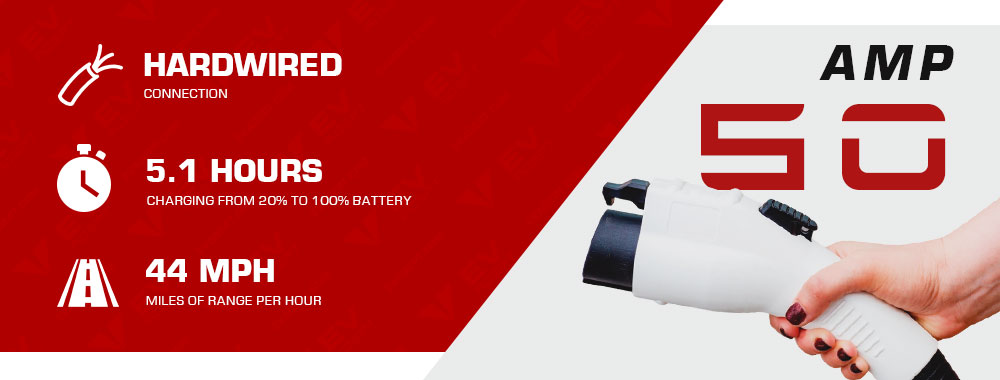
Hardwired 50 Amp EV charging stations
Hardwired appliances offer a higher installation cost due to the fact that they must be hard-installed into your home by professionals. This type of connection is considered safe compared with plug in types, which can sometimes lead users into danger if not done properly or securely enough for their needs; but don’t worry – we have some great options below!
- Supports 50-ampAUTO ENTERPRISE Level 2 EV Charging station 12 kW (240 Volt, 22ft/6m Cable, 12-50 Amp) HardwiredGet a great dealFeb 24, 2026 2:15 PM
- Get a great dealFeb 24, 2026 2:15 PM
- 50-Amp compatibleLeviton EV480 Level 2 Hardwired Electric Vehicle (EV) Charging Station (240 Volt, 18ft Cable, up to 48 Amp), WhiteGet a great dealFeb 24, 2026 2:15 PM
Plug-in chargers for 50 Amp circuit breaker
We have the best NEMA 14-50 and NEMA 6-50 charger for you. We selected models based on many factors including customer experiences and verified marketplace buyers.
Check out this 50 amp electric car charger! It’s perfect for charging your batteries on the go. You’ll get 9,600W of power with a 240 volt supply and it can easily accommodate most vehicles- including those that are larger than what is typically seen at gas station pumps these days (think: Tesla).
Home charging stations can charge an electric car at different speeds. The faster the charge, the better! A 75 kW battery would take about 4 hours to fully recharge with a 40A charging station.
We all know NEMA 14-50 as the “High power residential socket” and it can be found in most homes. Devices that are not over 40 amps will fit onto this type, but there’s more than just electricity going on here! A lot of people also use these outlets for their plugs when they charge EVs like Tesla. Discover the full review of the NEMA 14-50 chargers here.
Level 2 Electric Vehicle (EV) charger is great for those who want to charge their electric car quickly. A Level 1 charger can take hours while a level 2 will do so in about 20 minutes!
At a 50 Amp charging station, how long does it take to charge an electric vehicle?
| Chevy Bolt | 6 h 53 min |
| Volkswagen ID.4 | 5 h 25 min |
| KIA Niro EV | 4 h 5 min |
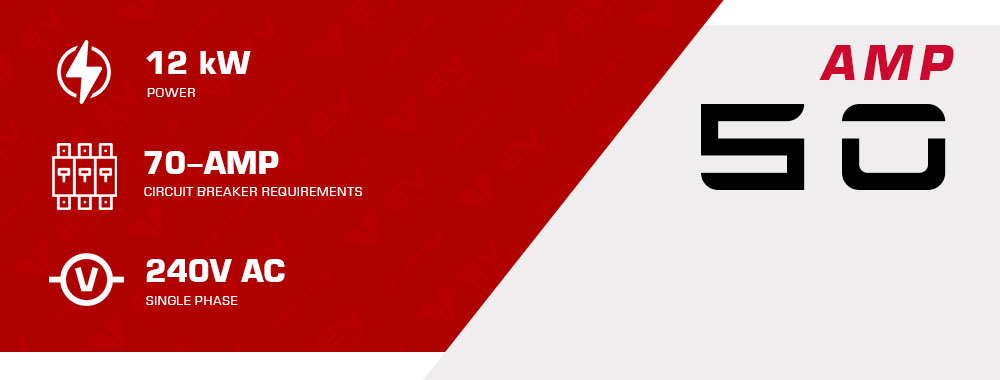
Comparison table for hardwired 50 Amp EV charging stations
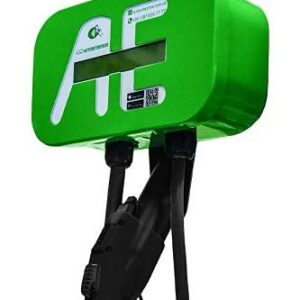 | 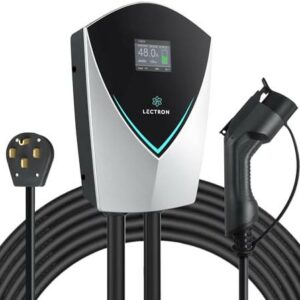 | 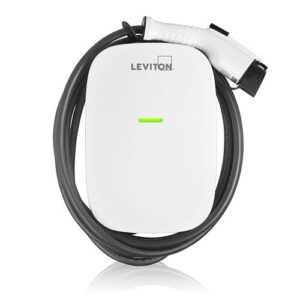 | 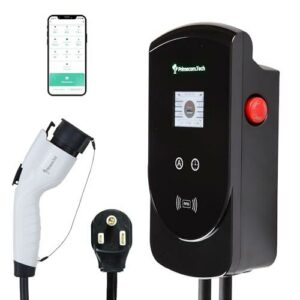 | 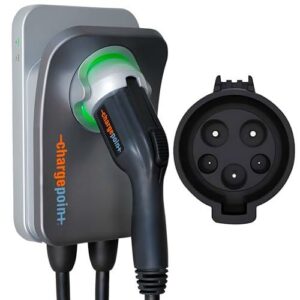 | |
| AUTO ENTERPRISE Level 2 EV Charging station 12 kW (240 Volt... | Lectron Level 2 Electric Vehicle (EV) Charging Station (240... | Leviton EV480 Level 2 Hardwired Electric Vehicle (EV) Charg... | PRIMECOM Level 2 EV Charging station 12 kW (240Volt, 30ft/9... | ChargePoint NEMA 14-50 plug/hardwired Home Charging Station... | |
| Overview | EVSE with IP65 protection class, IK10 mechanical protection. Charging speeds of up to 50 amps. | This charger offers two connection options and two maximum power options, making it perfect for EV owners. Hardwired connections are eligible up to 48 amps. | Charge Smarter, Not Just Faster. The Flexibility to Work with Any Home. Works with Any EV. Hardwired connections are eligible up to 50 amps. | ||
| Brand | AUTO ENTERPRISE | Lectron | Leviton | PRIMECOM | chargepoint |
| Amperage | 12, 16, 24, 32, 40, 48, 50 | 16, 24, 32, 40, 48 | 48 | 50 | 16, 24, 32, 40, 48, 50 |
| Voltage | 240 | 240 | 240 | 240 | 240 |
| Cable length, ft | 22 | 20 | 18 | 30 | 23 |
| Socket | NEMA 14-50 | NEMA 14-50 | |||
| Travel/Portable | No | No | No | ||
| Wall/Stand | Wall | Wall | Wall | Wall | Wall |
| Waterproof | IP65 | IP55 | IP56 | Yes | |
| Weight | 27 | 19.06 | 18.52 | 17.41 | 17.6 |
| Working temperature | n/a | n/a | -40°F to 113°F | ||
| Warranty | n/a | 2 years | 1 year | 3 years | |
| Certificate | n/a | Energy Star Certified | UL/Energy Star Certified | CE️ | UL certificate 20190607-E328478 issued 06/07/2019; Type 3R per UL 50E; ENERGY STAR qualified 06/25/19. |
| Wi-Fi | No | No | Yes |
If you’re an electrician, then you’re probably familiar with the 80% rule in the NEC code. But what is it? And how does it apply to EV chargers?
The 80% rule is a guideline in the National Electric Code that suggests that electrical circuits should be designed to carry no more than 80% of their rated load. This helps to ensure that the system is safe and reliable.
For example, if you have a NEMA 14-50 outlet (which has a maximum power rating of 50 amps), then your EV charger should not output more than 40 amps.
This is an important safety precaution, as exceeding the outlet’s maximum power rating could cause the wiring in the outlet to overheat and potentially start a fire. So when choosing an EV charger, be sure to take into account the maximum power rating of the outlet it will be connected to.
Comparison of plug-in chargers for 50 Amp circuit breaker
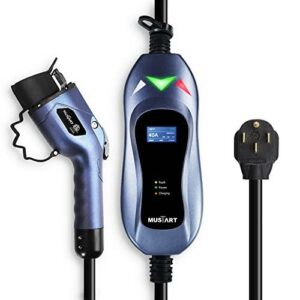 | 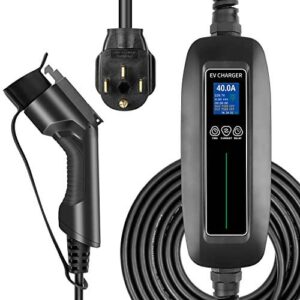 | 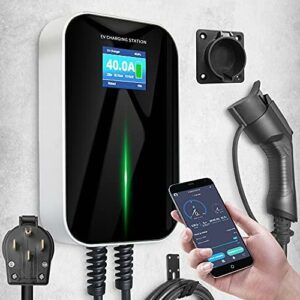 |  | 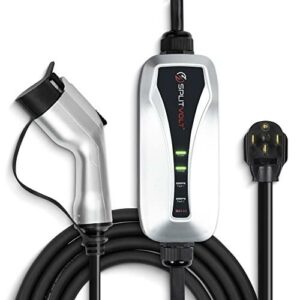 | |
| MUSTART Level 2 Portable Electric Vehicle (EV) Charger (240... | Elecvlife Level 2 Portable EV Charger 9.6 kW (240Volt, 25ft... | Morec Level 2 EV Charging station 9.6 kW (240Volt, 20ft/6m ... | PRIMECOM Level 2 EV Charging station 9.6 kW (240 Volt, 30ft... | Splitvolt Level 2 Portable EV Charger 9.6 kW (240Volt, 16ft... | |
| Brand | MUSTART | Elecvlife | Morec | PRIMECOM | Splitvolt |
| Amperage | 40 | 16, 24, 32, 40 | 40 | 40 | 40 |
| Voltage | 240 | 240 | 240 | 240 | 240 |
| Cable length, ft | 25 | 25 | 20 | 30 | 16 |
| Socket | NEMA 14-50 | NEMA 14-50 | NEMA 14-50 | NEMA 6-50 | NEMA 14-50 |
| Travel/Portable | Yes | Yes | No | Yes | Yes |
| Wall/Stand | Wall | Wall | |||
| Waterproof | Yes | IP65 | IP66 | IP56 | n/a |
| Weight | 14.01 | 10.93 | 13.77 | 16.02 | 9.15 |
| Working temperature | n/a | -22°F to 158°F | n/a | n/a | n/a |
| Warranty | 2 years | n/a | 1 year | 1 year | 1 year |
| Certificate | n/a | n/a | CE / TUV | CE️ | n/a |
| Wi-Fi | No | No | Yes | No | No |
When it comes to EV chargers, there are a few things you need to consider before making a purchase. One of the most important factors is the power of the charger.
Chargers come in a range of amperages, so it’s important to choose one that can handle your vehicle’s charging needs.
Another important factor is connection type. The NEMA 14-50 wall plug (your EV gets 9.6kW) or direct hardwire connection (your EV gets 12kW) can be used to charge an EV. If you don’t have a dedicated EV charging port, you’ll need to get a charger with a NEMA 5-15 (1.4kW) plug.
Finally, it’s important to consider the wattage of the charger. Most high power EV chargers range from 7.2 kilowatt (kW) to 19.2 kW. A higher-wattage charger will charge your EV faster, but it will also cost more to operate.
When choosing an EV charger, it’s important to consider its power, connection type, and wattage. By doing so, you can ensure that you select a 50 amp charger that meets your needs and budget.
Reference
https://teem.ornl.gov/ev-charging-coverage.shtml
https://www.dli.mn.gov/sites/default/files/pdf/NECFAQ20.pdf
https://www.boston.gov/sites/default/files/file/2019/12/How%20To%20Install%20an%20EVSE.pdf

What is the Tesla charging speed of 50 amp?
Talk to an electrician and let them know that Tesla recommends NEMA 14-50. This is a 240V outlet with a 50 amp circuit breaker. This will charge the Tesla Model 3 at approximately 30 miles per hour.
Are all 50-amp plugs the exact same?
A 50-amp RV plug is not 240V or 120V. Two prongs on an RV plug typically have 120 Volts. The two prongs of an RV plug offer separate 50 Amp/120V, and a total voltage of 240V. If it has four prongs, a 50 Amp RV plug will only be 240 Volts.
Is it safe for an EV to be charged at 50 amps?
While charging at 50 amps can be fast, it is safe. Some models have a limit. Limits can be found in Mike Becker’s calculator.
Is it possible to charge Tesla using mains power?
Yes. All new Tesla cars come standard equipped with a Type G adapter (220 – 244 V). Depending on the car, this adapter provides between two and four miles per hour. I recommend installing a Wall Connector for the best home charging experience.
What does a 240-volt outlet look like?
Use the Google Image =) The 240-volt outlet has two vertical side holes, an L-shaped hole at the top and a bottom hole that looks half-circle. The ground wire is an extra feature in modern four-pronged outlets that prevents electrical shock. A 240-volt outlet measures approximately 4 1/2 inches high by 4 1/2 inches wide.
Had a Siemens Level 2 for about 6 months. My Chevy Bolt charges perfectly with it. What I appreciated the most is its durability. I’ve had other chargers in the past give out on me in extreme weather, but this one’s solid. It’s a bit pricey but given its performance, I think it’s worth the money. Thoughts on longevity from anyone who’s had it longer?
I’ve had the PRIMECOM.TECH Level-2 Smart charger for my Nissan Leaf. Good charge speed, and I love the long cable. But after 8 months, started facing some minor glitches with the smart interface. Anyone else faced this?
Regarding the Tesla Wall Connector, how’s the compatibility with non-Tesla EVs? I’ve got a BMW i3 and wondering if anyone has firsthand experience. And any advice on setting it up for an i3 specifically?
I’ve got the Tesla Wall Connector for my BMW i3. At first, I was skeptical, but it’s been working pretty well. You will need an adapter though. The charging speed is decent, but I do have a dedicated electrician who set it up for me. If you’re doing it yourself, just make sure to follow the manufacturer guidelines closely.
Between the Siemens and PRIMECOM, which one’s better for a first-time EV owner? I just got a Hyundai Kona Electric and want something that’s user-friendly but doesn’t compromise on performance.
I’ve had both the Siemens and the PRIMECOM for two different vehicles. Siemens feels more robust and has stood the test of time. PRIMECOM’s smart features are great when they work. For a Kona, I’d recommend Siemens – straightforward and reliable.
Looking at the specs, the Siemens Level 2 offers 9,600W power which seems to outperform the PRIMECOM.TECH on paper. Considering they’re both 50 amp chargers, what factors should one consider before deciding? Does higher wattage always translate to a better charging experience?
Has anyone faced issues with the Tesla Wall Connector when charging in very cold weather? Mine seems to slow down considerably, and I’m not sure if it’s the charger or my vehicle acting up. I’ve got a Model Y, for reference.
Just got news that there’s a new software update rolling out for the PRIMECOM.TECH Level-2 charger. Supposed to improve the smart interface and address some bugs. Ensure you check for updates!
Read a report about counterfeit adapters being sold online for the Tesla Wall Connector. Please ensure you buy from authorized sellers. Using counterfeit adapters could damage your EV or even pose serious safety risks. Anyone aware of this?
I’m looking to buy a Siemens Level 2 EV charger, and I’ve heard there’s a discount for bulk purchases. Anyone else interested in partnering up for a group buy? Based in Seattle, if that helps.